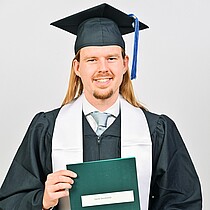

Article: Tuesday, 9 July 2024
Crises can accelerate adoption of healthcare innovations in general practices – but the effect seems mostly temporary and innovation usually relies on the enthusiasm of a few general practitioners who like to innovate anyway. But their efforts do pave the way for further innovations. These findings are presented in a master thesis researched and written by Daniel Sieczkowski, a recent graduate of the MSc Management of Innovation at Rotterdam School of Management, Erasmus University (RSM). His thesis, Diffusion of healthcare innovations during crisis - A multiple-case study of general practitioners during the Covid-19 pandemic has won one of four Professor Jo van Nunen Awards for 2023.
Innovation can be a force for positive change in society, especially in sectors that are under pressure for available resources, yet traditionally slow to change – like healthcare. Crises like pandemics, wars, and climate change are inevitable but by modelling how a crisis can accelerate innovation, Daniel’s research contributes to understanding and finding ways to more effectively seize the innovation opportunities that appear in times of crisis.
The start of the Covid-19 pandemic in 2020 created a crisis in healthcare that necessitated innovation – but exactly how crises accelerate innovation has not been widely studied. Daniel Sieczkowski’s study aimed to understand the mechanisms by which crises accelerate innovation so that others could use opportunities for stimulating innovation – and bring positive effects for business and society. He reviewed the literature, interviewed general practitioners who were known to be among the most innovative, and analysed public documents about their experiences. He then let his data tell the story.
Daniel found that the crisis did indeed accelerate the adoption of innovations in general practices – but only temporarily. And in general, innovating during a crisis is pretty similar to innovating when there is no crisis, so innovation strategists can still use familiar theories of innovation for their insights.
Daniel observed that innovation was accelerated because the crisis produced external forces that pressured practices to act quickly, and showed the merits of adopting innovations in other settings. With the acceleration of innovations, further innovations became possible. These three mechanisms also temporarily reduced three effects that usually acted as barriers: bureaucracy, financial constraints, and time constraints.
For example, healthcare insurers realised that a temporary reduction of the burden of paperwork and the hurdles for getting reimbursement would mean healthcare could continue to function in the Covid-19 crisis.
And there were temporarily fewer patients for general practitioners to see because people hesitated to bother them with small complaints when it was obvious that healthcare professionals were struggling with overflowing emergency rooms of Covid patients. This gave general practitioners more time to innovate.
But when the immediate crisis was over, the adoption of innovations fell back to its previous baseline rate. Daniel called this a ‘fragile, non-scalable and increasingly untenable hobbyism upheld by a few of the Netherlands’ innovator general practitioners’.
Daniel suggested these most-innovative general practitioners keep their innovating habits going because they might have informal support and can do their innovation work outside of their regular work schedule or with the help of family or friends, or they have expectations of the benefits that innovations will bring that are higher than average. But most of all, he suggests, these innovating general practitioners have an intrinsic enjoyment of being among the first to adopt innovations, even when the formal healthcare system makes it difficult.
Daniel concluded that understanding where the market has barriers and where it facilitates innovation can also be the key to entering it – for example general practitioners are short of time, so time-saving innovations are more likely to be adopted.
Daniel Sieczkowski has the following findings from his master thesis on innovation for general practitioners:
Crises like Covid-19 temporarily accelerate healthcare innovation by reducing barriers such as bureaucracy and financial constraints.
Post-crisis, innovation rates revert to a baseline driven by a few passionate general practitioners, making the process fragile and non-scalable.
Identifying and addressing market barriers, such as time constraints for general practitioners, is crucial for driving effective innovation.
Viewing crises as opportunities can lead to more effective responses and better preparation, fostering flexibility and collaboration for innovation.
He also discovered that these general practitioners who love to innovate feel that the system barely supports their innovating efforts and that’s why so few of them innovate. They compensate for the lack of support from the healthcare system by using personal resources – like getting their friends to help for free with tasks like implementing software, and by using their limited time outside of working hours to innovate for their work.
Daniel suggests his research shows that other businesses can align their innovation plans around the anticipated dynamics of crises. And by being better able to understand the contexts of crises, they will probably perceive them as less threatening, meaning their responses are likely to be less negative, less emotional and more effective. Adopting an attitude that crises are opportunities encouraged flexibility and open-mindedness, both of which help innovation.
And for those who fear innovating or do not want to innovate, associating and co-operating with people who do like to innovate is a good way to harvest the fruits of innovation without the need to sow them yourself, advise the innovative general practitioners. “This simple piece of advice can easily be implemented right away, yet can also have a profound positive impact,” commented Daniel.
Department of Technology and Operations Management
Rotterdam School of Management (RSM)
Erasmus University Rotterdam


Science Communication and Media Officer
Rotterdam School of Management, Erasmus University (RSM) is one of Europe’s top-ranked business schools. RSM provides ground-breaking research and education furthering excellence in all aspects of management and is based in the international port city of Rotterdam – a vital nexus of business, logistics and trade. RSM’s primary focus is on developing business leaders with international careers who can become a force for positive change by carrying their innovative mindset into a sustainable future. Our first-class range of bachelor, master, MBA, PhD and executive programmes encourage them to become to become critical, creative, caring and collaborative thinkers and doers.
